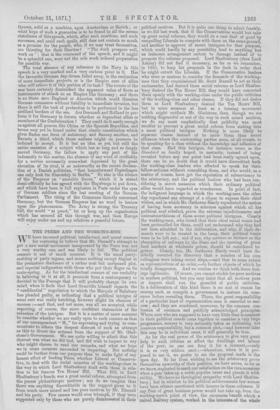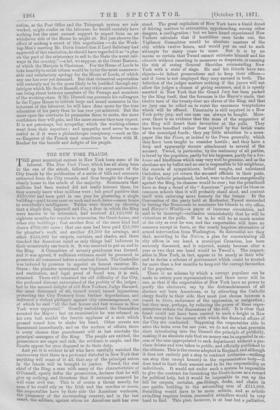THE PEERS AND THE WORKING-MEN.
WE have incurred political, intellectual, and moral censure for venturing to believe that Mr. Disraeli's attempt to get a new social movement inaugurated by the Peers was not a very worthy one, and was likely to fail, The political censure is not of much moment. It is the usual party- scolding of party organs, and means nothing except disgust at the premature disclosure of a rather neat but unripened plot, and especial indignation with those who put their finger on its main-spring. As for the intellectual censure of our credulity in believing in it at all, it proceeds from a contemporary so devoted to the Peerage that it will probably change its own mind, when it finds that Lord Granville himself regards the " confidential" negotiation to which the Marquis of Salisbury has pleaded guilty, as indicating that a political intrigue of some sort was really hatching, however slight its chances of success ;—and that, and not more, was all we accepted, while reporting, of course, the more confident statements of the revealers of the intrigue. But it is a matter of more moment to consider whether we are really open to such censure as that of our correspondent " M.," for expressing and trying to com- municate to others the deepest distrust of such an attempt as this to divert the artisans from the support of Mr. Glad- stone's Government. We are quite willing to admit that this distrust was what we did feel, and did wish to impart to any who might choose to read our remarks, and what we hope we in some measure succeeded in imparting. But nothing could be further from our purpose than to make light of any honest effort of leading Peers, whether Liberal or Conserva- tive, to deal with the social miseries of the working-class in the way in which Lord Shaftesbury dealt with them in rela- tion to his famous Ten Hours' Bill. That Bill, in Lord Shaftesbury's hands, was a great social reform, attempted from the purest philanthropic motives ; nor do we imagine that there was anything discreditable in the support given to it from much more mixed and less pure motives by Mr. Disraeli and his party. Few causes would ever triumph, if they were supported only by those who are purely disinterested in their
political motives. But it is quite one thing to admit frankly, as we did last week, that if the Conservatives would but take up great social reforms, they would do a vast deal of good by compelling Liberals to compete with them on the same ground, and another to approve of secret intrigues for that purpose, which could hardly by any possibility lead to anything but an insincere arrangement certain to damage instead of to promote the reforms proposed. Lord Shaftesbury (then Lord Ashley) did not find it necessary, as far as we remember, in 1811, to keep his proposals in the dark in order that he might outwit the Liberals. If the Conservative leaders who were so anxious to consider the demands of the working- men that they commissioned Mr. Scott Russell to act as their ambassador, had desired these social reforms as Lord Shaftes- bury desired the Ten Hours' Bill, they would have concerted them openly with the working-class under the public criticism of the working-class and other classes. If they did not desire them as Lord Shaftesbury desired the Ten Hours' Bill, but in some measure at least as a turning movement which might outflank Mr. Gladstone, then, though we see nothing disgraceful or out of the way in such mixed motives, we do say most emphatically that publicity was most needful to prevent a great social reform from sinking into
a mere political intrigue. Nothing is more likely to separate classes instead of to unite them than secret alliances where the contracting parties seem, at all events, to be speaking for a class without the knowledge and adhesion of that class. Had this intrigue, for instance, come, as the Standard so fondly hoped, to maturity, instead of being revealed before any one point had been really agreed upon, there can be no doubt that it would have discredited both the working-class leaders who affected to speak for their fellow-artizans without consulting them, and who would, as a matter of course, have got the reputation of subserviency to the aristocracy, and the political leaders who had been con- sidering in secret measures which their ordinary political allies would have regarded as treacherous, In point of fact, the indignant language in which the working-men the other day repudiated any attempt of a clique to express their chief wishes, and in which Mr. Gathorne Hardy repudiated the notion of having been accessory to schemes against which all his political soul rebelled, prove the extreme injudiciousness and untrustworthiness of these secret political intrigues. Clearly the working-men, who found that their chief social wants had been protocolled for them, could not understand why they had not been admitted to the deliberation, and why, if their de- mands worn to be treated in the lump, their political wants were to be left out ; and if not, why matters so distinct as the absorption of railways by the State and the opening of great food markets at wholesale prices, should be considered to- gether. Clearly, too, Mr. Gathorno Hardy would have de- cidedly resented the discovery that a number of his own colleagues were taking secret steps,—and that to some extent as representatives of an order,—to further objects of which ho totally disapproves. And we confess we think both these feel- ings legitimate. Of course, you cannot stickle for pure motives in matters political, but you may insist that all motives pure or impure shall run the gauntlet of public criticism. In a deliberation of this kind there is no sort of reason for secresy such as compels a government to mature its mea- sures before revealing them. There, the great responsibility of a particular knot of representative men is essential to suc- cess ; and they are combined, moreover, by the common con- fession of common and publicly acknowledged principles. Whore men who are supposed to have very little that is common to their political creeds come together to consider a very large programme, seems), is very naturally taken as indicating not common responsibility, but a common plot,—and however false this may be in individual cases, it will generally be true. As for the real power of the aristocracy to give very great help to such reforms as affect the dwellings and labour of the poor, no one can deny it for a moment,—only it is so very seldom used ;—wherefore, when it is pro- posed to use it, wo prefer to see the proposal made in the open day. So far from wishing to see the aristocracy prove themselves unworthy of their position, we have never, so far as we know, neglected to mark our satisfaction on the rare occasions when a peer takes up a noble popular cause and pleads it with ability. We have no theological sympathy with Lord Shaftes- bury ; but in relation to his political achievements few names have been oftener mentioned with honour in these columns. If any Peer of great business power would but take up, from the working-mon's point of view, the enormous benefit which a united Railway system, worked in the interests-of the whole nation, as the Post Office and the Telegraph system are now worked, might confer on the labourer, he would certainly have nothing but the most earnest support to expect from us, on whichever side of the House he might sit. But just observe the effect of making a secret of this negotiation :—At the Work- ing-Men's meeting Mr. Davis hinted that if Lord Salisbury had approved of this resolution, he should have regarded it as "a plan on the part of the aristocracy to sell to the State the worst rail- ways in the country,"—a hit, wo suppose, at the Great Eastern, of which the Marquis is Chairman. For the House of Lords to take heartily to social reform would be by far the most unanswer- able and satisfactory apology for the House of Lords, of which any one has ever yet dreamed. But that chimerical expectation will certainly not be the more likely to be justified through any intrigue which Mr. Scott Russell, or any other secret ambassador, can bring about between members of the Peerage and members of the working-class. If Mr. Disraeli can persuade his colleagues in the Upper House to initiate large and sound measures in the interests of the labourer, he will have done more for the true education of his party than ho has ever yet achieved. But the more open the overtures he persuades them to make, the more confidence they will gain, and the more success they may expect. It is not patronage, but sympathy, which the working-classes want from their superiors ; and sympathy need never be con- cealed as if it were a philanthropic conspiracy,—suoh as the ex-Emperor of the French used sometimes to devise with M. Rouher for the benefit and delight of his people.



































 Previous page
Previous page